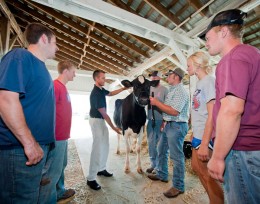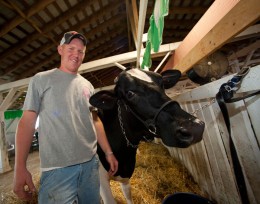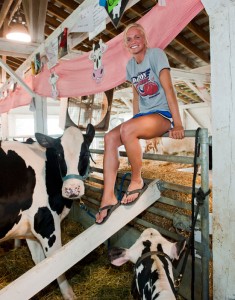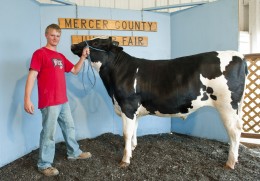
With a dairy cow at his side, Homan assists students in evaluating the conformation of the animal looking at its legs, neck, head and back.
It is Thursday afternoon. A searing midday sun is high overhead wrapped in pristine sky. Shady cover is scarce.
The Cattle Barn is warm and loud with activity at the Mercer County Fair in Celina, Ohio.
Dust and straw particles float in the air as boot-wearing youngsters scurry with hoses, brushes and buckets tending to their massive Angus and Holsteins. Deliberately the cows flap their tails, slowly chewing their cud and occasionally letting out a guttural mooooo!
It is a familiar setting for a small gaggle of college students from Wright State University’s Lake Campus and their professor Greg Homan.
Students who never thought they’d get to go to college and keep working on the family farm too.
On this day, Homan, Ph.D., has turned the fair into his classroom, utilizing again an apt atmosphere for teachable moments in agriculture.
With a dairy cow at his side, Homan assists students in evaluating the conformation of the animal looking at its legs, neck, head and back.
Before the trip to the fair, in his office at Lake campus, Homan shared part of his teaching strategy: “We don’t have the resources to expand dramatically. The resources are out of my pocket. Out of the things I can find.”
Wright State has found a way to fill a need for agriculture education in the northern Miami Valley.

Like many students in the region, Damon Bertke was tied to a farm business at home and thought he’d never be able to earn a degree.
“It was bound to happen. It had to happen. I think Wright State is benefitting because of it across the board,” said Damon Bertke, who got his associate’s of Technical Study degree in agriculture last July.
Like many students in the region, Bertke was tied to a farm business at home and thought he’d never be able to earn a degree.
“My senior year, I probably wasn’t going to go to college. But I ran into Greg and he told me about how this program was starting and I figured it was worth the 15- minute drive to at least try it,” said Bertke, who now works as a full-time herdsman at Bush Dairy in New Weston and helps with his dad’s dairy at home.
Bertke is like many other students in Mercer and Darke counties, the two top counties in Ohio in terms of agriculture receipts, livestock and cereal grain sold off the farm, according to Homan.
Bertke was one of the first students to graduate with an agriculture degree from Wright State, which now includes a bachelor’s in organizational leadership geared toward agriculture too.
He is one of dozens of students who have found they can stay close to home, work on the farm, graduate with minimum debt and finish with new professional connections by getting an ag degree at Wright State’s Lake Campus.
“They’re going to know agricultural professionals here locally that have adjunct classes, that have come into speak, and from touring and visiting farms and other ag operations.”

Like all dairy farmers, Carrie Uhlenhake gets up early every day to help milk. It is a labor-intensive process. Then she’s off to the Lake for class.
There were 21 students in the first ag classes in 2009. They were converts to a program that was just taking shape. Now, more than three years later the program is helping about 50 students interested in learning more about working in agriculture fields.
Homan has designed the burgeoning program to include constant contact with farming professionals through remote classroom work, internships and cross-country trips.
Homan has grown the program by connecting with high school programs and by staying flexible when it comes to class scheduling.
“Greg is willing to schedule classes around our work schedules, whether it be in the middle of the afternoon, or late at night after the chores are done,” said Bertke.
On-campus classes in advanced soils, farm management, veterinary anatomy and ag technology are balanced with trips to Cooper Farms, Bush Dairy, even California.
“Going out to California was so interesting,” Carrie Uhlenhake, who’s working on her associates. “From seeing all the irrigation systems to the manure digesters. It was just a completely different approach to agriculture and it really opened my eyes.”
Like all dairy farmers, Uhlenhake gets up early every day to help milk. It is a labor-intensive process. Then she’s off to the Lake for class.
“I thought about going further away, but that’s why I go to Lake—I can go to school and then I can come home, I can help milk and it’s all just a good package for me,” said Uhlenhake.
For Mitch Sudhoff, the program offers options.
“For me it offers a backup plan,” said Sudhoff. “I have a lot of brothers who want to run the family farm, but only one of us will get to do it, so I need the skills to get a job in ag somewhere else too.”
With contacts now at Farm Credit Services, Cooper Farms and the experience of touring fruit farms in California, ranches in Texas and the Land of Lakes research farm in Illinois, Sudhoff said he’s expanded his knowledge of agriculture in ways he never thought possible.


 Wright State names Rajneesh Suri dean of Raj Soin College of Business
Wright State names Rajneesh Suri dean of Raj Soin College of Business  ‘Only in New York,’ born at Wright State
‘Only in New York,’ born at Wright State  Wright State president, Horizon League leaders welcome new commissioner
Wright State president, Horizon League leaders welcome new commissioner  Wright State celebrates homecoming with week-long block party
Wright State celebrates homecoming with week-long block party  Wright State baseball to take on Dayton Flyers at Day Air Ballpark April 15
Wright State baseball to take on Dayton Flyers at Day Air Ballpark April 15 